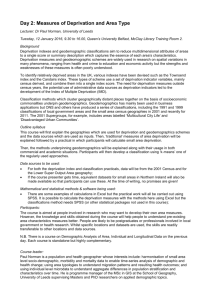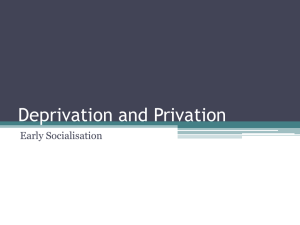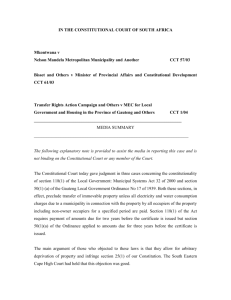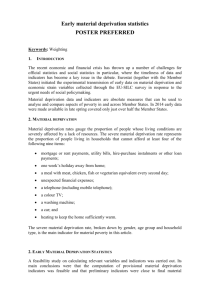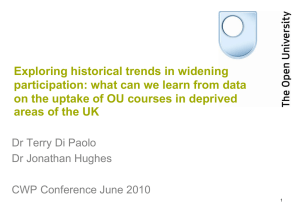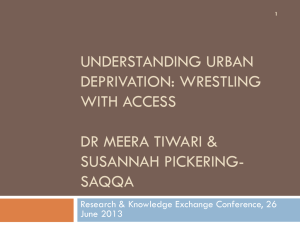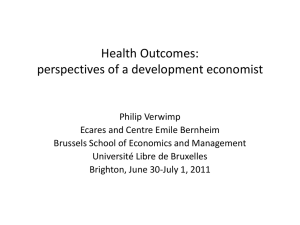Effects of deprivation and trauma
advertisement
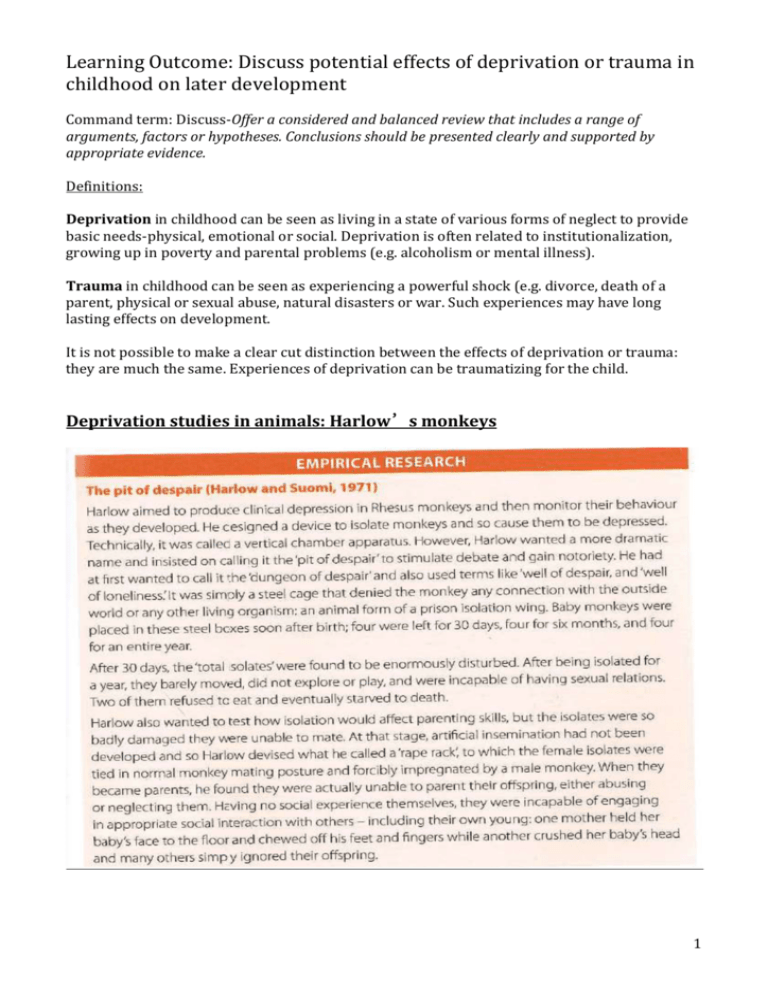
Learning Outcome: Discuss potential effects of deprivation or trauma in childhood on later development Command term: Discuss-Offer a considered and balanced review that includes a range of arguments, factors or hypotheses. Conclusions should be presented clearly and supported by appropriate evidence. Definitions: Deprivation in childhood can be seen as living in a state of various forms of neglect to provide basic needs-physical, emotional or social. Deprivation is often related to institutionalization, growing up in poverty and parental problems (e.g. alcoholism or mental illness). Trauma in childhood can be seen as experiencing a powerful shock (e.g. divorce, death of a parent, physical or sexual abuse, natural disasters or war. Such experiences may have long lasting effects on development. It is not possible to make a clear cut distinction between the effects of deprivation or trauma: they are much the same. Experiences of deprivation can be traumatizing for the child. Deprivation studies in animals: Harlow’s monkeys 1 Questions: 1. What were the ethical issues related to Harlow and Suomi’s pit of despair study? 2. Do you believe that Harlow’s research is ethically justifiable? Why/Why not? 3. Why do you have to be cautious when generalizing the finding of animal studies to humans? 2 Links to criminal behavior (information for interest only) 3 Deprivation studies in humans Definitions: Deprivation and Privation • Researchers distinguish between: • Deprivation – an attachment forms but is then discontinued • Privation – no opportunity is given for attachments to form • In practice it is difficult to distinguish between them completely Maternal deprivation hypothesis Bowlby (1953) made strong claims for the serious and permanent effects of early adverse experiences and was particularly concerned about the impact of maternal deprivation during the first three years of life. • • Based on Bowlby’s ideas: • Attachment is important for survival • Prototypes for later relationships Predicts developmental difficulty if the attachment relationship goes wrong: • General developmental problems • Specific issues with social development Prolonged deprivation of a young child of maternal care may have grave and far-reaching effects on his character…similar in form…to deprivation of vitamins in infancy.” Bowlby (1953) 4 General criticisms of early deprivation studies 5 Early studies of deprivation focused on children who had been separated from their families during the Second World War and were brought up in institutions. In many of these institutions, physical care was basic and there was little by way of emotional care, warmth or the opportunity to attach. Many studies found that institutionally raised children showed permanent intellectual impairment, scoring lower on intelligence tests. However, subsequent studies of institutionalized children indicated that many of the effects were related to very poor conditions and lack of stimulation in institutions at that time. Tizard and Hodges (1978, 1989) examined a group of children who spent their early childhood in an institution, where good physical care was provided and the environment was stimulating. The only area of deprivation experienced by children was the lack of an ongoing secure attachment with an adult caregiver. Read the following studies and then answer the questions. Rutter et al 2004 6 Questions: 7 1. In what way were the children deprived in Tizard and Hodges study? 2. What do you know about the conditions in a Romanian Orphanage in the 1990’s? 3. What type of experimental technique do both Rutter et al (2007) and Tizard and Hodges (1978) make use of? 4. What are the strengths and weaknesses of using this technique? Overall Conclusions from Tizard and Hodges (1978, 1989) and Rutter et al 2004 When institutionalized children are placed in families, they generally show marked improvements in physical, social and cognitive functioning. Children who spend short periods of time in institutions generally experience few longterm negative effects. When the period of institutionalization ends before the age of 6 months, children are likely to show few permanent effects. Children who spend longer times in impoverished environments often continue to show persistent behavioural problems and disinhibited attachments It is difficult, if not impossible, to accurately quantify the type and level of deprivation experienced by children in institutions such as the Romanian orphanages of the 1990’s. Interest is turning to the potential impact of early adverse experiences on biological processes, notably stress hormones such as cortisol. Some findings imply that specific 8 aspects of brain behavioural circuitry may be particularly vulnerable to early aversive experience and some studies demonstrate a relationship between unresponsive or neglectful environments and blunted cortisol responses to stress in young children. Read the text below and answer the questions in the space provided over the page. 1. 9 2. 3. Are the findings from this study in line with what Bowlby believed? 4. Does the fact that the boys were twins influence the findings? Trauma studies Some children experience trauma such as the death of a parent or chronic, disabling illness. Jacobs (2009) examined the impact of death of a parent in childhood in relation to later adjustment. Almost 3,500 participants in Baltimore, USA were identified in 1981 and followed through 1994-1995. Jacobs found that the death of a mother did not predict later mental health problems but death of the father during childhood more than doubled the risk for depression in adulthood. Jacobs argues that parental death can lead to serious financial stress (e.g. the need to move house and school), which can continue and further complicate adaptation and loss. 10


